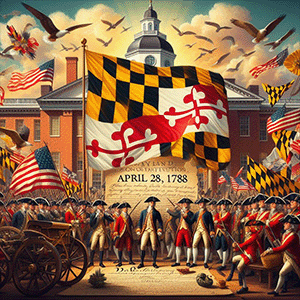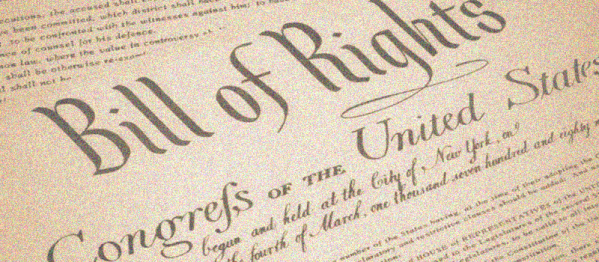In this episode of Constitution Thursday from August 2013, Dave & John delve into the intricate process of statehood within the United States, focusing on the historical and legal journey of West Virginia's admission into the Union on June 20, 1863. As we explore Article 4, Sections 3 and 4 of the U.S. Constitution, we... Continue Reading →
The Bill of Rights – Step One
On June 8, 1789, James Madison introduced a series of amendments to the US Constitution in the first session of Congress. These proposed amendments were meant to address the concerns of the Anti-Federalists who feared that the new national government would trample individual liberties. Ultimately, these proposals led to the adoption of the Bill of... Continue Reading →
The Quartering Act
The Quartering Act of 1774, part of the series of punitive measures known as the Intolerable Acts, was enacted by the British Parliament on June 2, 1774. This legislation sought to address the housing needs of British soldiers stationed in the American colonies. However, the roots of the Quartering Act can be traced back to... Continue Reading →
Rogue Island Comes Around
We have this... myth... in our heads. It's born from a combination of Manifest Destiny and the desire to see ourselves in a certain light, but the truth is that the Constitution of the United States was highly radical, highly controversial and absolutely not universally proclaimed as the best way of governing ourselves in 1787.... Continue Reading →
That Pesky 2nd Amendment
On May 7, 1992, the original 2nd Amendment to the US Constitution was finally ratified, now as the 27th Amendment. Getting there wasn't as simple...
Washington, D.C.
Washington, D.C., the capital city of the United States, was officially incorporated on May 3, 1802. This milestone in American history not only marked the formal establishment of its governance but also underscored the city’s central role in the national identity and administrative function of the country. The history of Washington, D.C., from its founding... Continue Reading →
Maryland, My Maryland
In the heated debates surrounding the ratification of the U.S. Constitution, Maryland played a pivotal role as the seventh state to endorse the new framework of government on April 28, 1788. The state's decision was not made lightly; it reflected deep discussions and conflicts over federal power, representation, economic regulations, individual rights, and the contentious... Continue Reading →
Direct Election
The 17th Amendment to the United States Constitution marks a pivotal shift in the method of electing senators, transitioning from legislative selection to direct election by the people. This amendment, ratified on April 8, 1913, fundamentally altered the landscape of American democracy. This article explores the background, catalysts, legislative journey, ratification process, initial impact, judicial... Continue Reading →
Righting the Wrong
The ratification of the 13th Amendment by the State of Mississippi stands as a unique chapter in the annals of American history. This Amendment, which abolished slavery in the United States, was adopted by Congress on January 31, 1865, and ratified by the requisite number of states by December 6 of the same year. However,... Continue Reading →
Terms of Power
On February 27, 1951, the United States ratified the 22nd Amendment, a pivotal moment in American constitutional history that imposed term limits on the presidency. This landmark amendment was the culmination of decades of debate over the concentration of power in the executive branch and reflected the nation's evolving attitudes toward leadership and democracy. The... Continue Reading →
The Pivotal Day
Shays' Rebellion, an uprising that unfolded in Massachusetts between 1786 and 1787, stands as a significant event in the early history of the United States. This rebellion, led by Daniel Shays, a former captain in the Continental Army, was primarily fueled by economic grievances and political injustice faced by rural farmers and war veterans in... Continue Reading →
Tax Season
https://open.spotify.com/episode/6g3I49v82XAw1DlEBpdme0?si=914cef53a9e04516 The Brushaber v. Union Pacific Railroad case, decided by the United States Supreme Court on January 24, 1916, stands as a cornerstone in American constitutional law, particularly in the realm of taxation. This landmark case arose in the wake of the Sixteenth Amendment's ratification in 1913, which fundamentally altered the federal government's power to... Continue Reading →
Hamilton!
Welcome, listeners, hour three of the Bill Mick Live Show. As is our tradition, we are joined by Dave Bowman for Dave Does History, where we will take a journey through the tumultuous and trailblazing life of one of America's most influential Founding Fathers - Alexander Hamilton. Born in obscurity, risen to glory, and fallen... Continue Reading →
Charles Sumner
Charles Sumner, born on January 6, 1811, in Boston, Massachusetts, was a towering figure in American history known for his unyielding opposition to slavery and his enduring commitment to civil rights. As a prominent politician and senator, his legal acumen, eloquent oratory, and moral conviction positioned him at the forefront of the anti-slavery movement. Despite... Continue Reading →
Georgia Ratifies
Georgia's decision to ratify the U.S. Constitution was influenced by several factors unique to its circumstances. As a smaller and less populous state, Georgia saw the Constitution as a means to gain equal representation in the Senate, thus balancing the power of larger states. Additionally, security was a significant concern for Georgia, which faced threats... Continue Reading →
An Act to Prohibit the Importation of Slaves
The more I study the antebellum period, the more convinced I am that today we have almost no real understanding of what was dividing the nation. I mean, we *know* that it was slavery, but we have no understanding of why or even how those debates were conducted, nor even what the position of various... Continue Reading →
Andrew Johnson
Andrew Johnson, the 17th President of the United States, was born on December 29, 1808, in a modest log cabin in Raleigh, North Carolina. Orphaned at a young age, Johnson never attended school. He was apprenticed as a tailor, a trade that he would continue throughout his early life. Despite his lack of formal education,... Continue Reading →
The 13th Amendment
The abolition of slavery in the United States, marked by the ratification of the 13th Amendment on December 18, 1865, stands as a pivotal moment in American history, fundamentally reshaping the nation's social, economic, and political landscape. This historical milestone culminated from a complex interplay of moral, economic, and political factors and had far-reaching consequences... Continue Reading →
The Sentinel of Liberty
In a development that will undoubtedly alter the course of our young Republic, the first ten amendments to the Constitution, collectively known as the Bill of Rights, have been ratified this day, December 15, 1791. This momentous occasion marks a significant, albeit begrudging, concession by the Federal government in recognizing and protecting the liberties of... Continue Reading →
A Cunning Plan
https://open.spotify.com/episode/53NdnrFkS0DcOjscJK5xJ5?si=a2f7f2407c4c4ef5 On December 12, 1787, the State of Pennsylvania ratified the Constitution of the United States, the second State to do so. The debates that would later erupt in New York and North Carolina were quickly bypassed as the State moved very to deal with the issues at hand. Like almost every State, Pennsylvania would... Continue Reading →


















